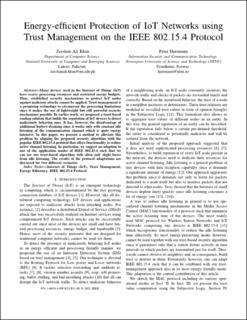Energy-efficient Protection of IoT Networks using Trust Management on the IEEE 802.15.4 Protocol
Original version
2021 11th IFIP International Conference on New Technologies, Mobility and Security (NTMS) 10.1109/NTMS49979.2021.9432670Abstract
Many devices used in the Internet of Things (IoT) have scarce processing resources and restricted energy budgets. Thus, established security mechanisms to protect IoT nodes against malicious attacks cannot be applied. Trust management is a promising technology to circumvent the processing limitations since it makes the use of lightweight but still powerful security mechanisms possible. In earlier work, we proposed a trust-based routing solution that builds the reputation of IoT devices to detect maliciously behaving ones. It has, however, the disadvantage of additional battery draining since it works only with constant idle listening of the communication channel which is quite energy intensive. In this paper, we present a method to alleviate this problem by aligning the proposed security algorithm with the popular IEEE 802.15.4 protocol that offers functionality to reduce active channel listening. In particular, we suggest an adaption to one of the application modes of IEEE 802.15.4 such that we can use our trust-based algorithm with often only slight losses from idle listening. The results of the protocol adaptations are discussed for two different scenarios.
